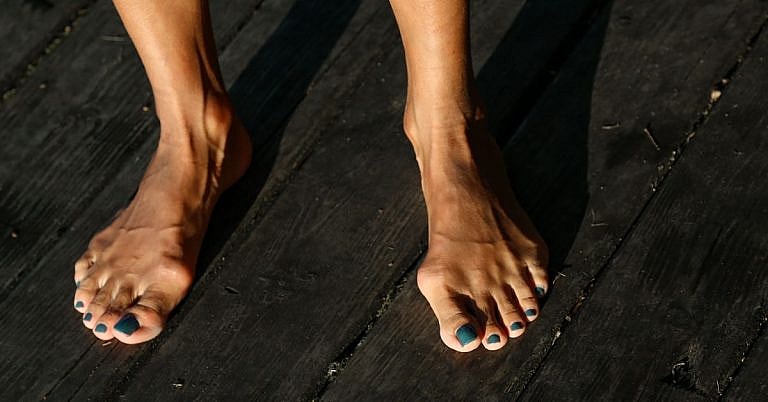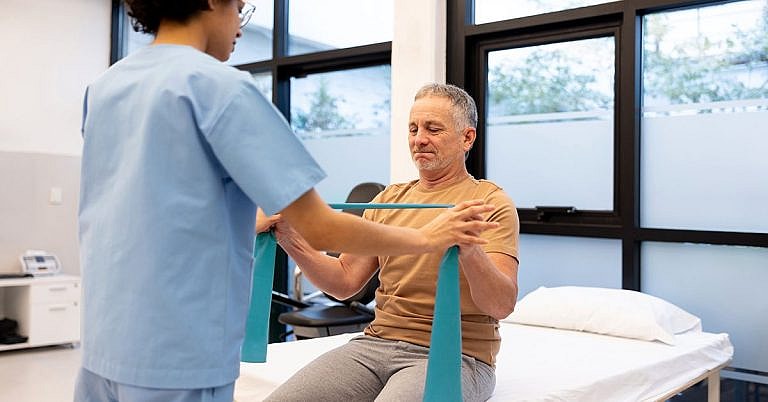What are Hemorrhoids?
[trp_language language=”en_US”]
Hemorrhoids, also known as piles, are swellings that occur when the blood vessels in and around the lower rectum and anal canal become enlarged or swollen. This may cause itching, bleeding and discomfort, though in some cases, no symptoms at all may be present.[1]
Hemorrhoids are very common and typically cause no serious health problems. They can, however, be uncomfortable and irritating, meaning medical attention is advised. Treatment options are available and are usually successful in managing the symptoms.
Grading and symptoms of hemorrhoids
Hemorrhoids are categorized into four distinct grades. Symptoms vary according to which grade is being experienced:[2]
- Grade 1: Swellings are small and located at the beginning of the the anal canal where they cannot be seen or felt. This is the most common type of hemorrhoids.
- Grade 2: Swellings are larger and may be pushed out of the anus when using the bathroom or after abdominal pressing of another kind, such as sneezing or coughing.
- Grade 3: Swellings hang out of the anus when using the bathroom or during abdominal pressure of another kind, such as sneezing, but can be pushed back inside.
- Grade 4: Swellings hang out of the anus and cannot be pushed back inside.
In some cases, no symptoms occur, and a person might not even realize they are experiencing the condition.
In other cases, symptoms may include:[3]
- Rectal bleeding, usually painless, after defecating
- Itching or pain in and around the anus
- Difficulty cleaning the anus after defecating
- The feeling of a wet anus or leaking feces.
If you are concerned that you may have hemorrhoids, You can search for nearest doctor Find my doctor.
When to seek medical advice
In the majority of cases, hemorrhoids are non-serious and, in grade one hemorrhoids, the symptoms may clear up without treatment.
However, if the symptoms are persistent or severe, medical attention should be sought. This is particularly necessary if an individual experiences rectal bleeding, as this could be a result of a variety of other more serious conditions.[1]
Causes of hemorrhoids
The exact cause of hemorrhoids is unknown, and some people seem to experience the condition for no apparent reason. However, hemorrhoids are thought to be a result of increased pressure in the abdomen, rectum and/or the anal canal, causing engorgement of the blood vessels in the anal canal. This could be caused by factors such as periods of prolonged constipation, chronic diarrhea and/or a lack of fibre in one’s diet.
Other factors that may increase the risk of hemorrhoids include:[1]
- Obesity or being overweight
- Pregnancy
- Repeated heavy lifting
- Coughing or vomiting regularly
- Age (older people are more susceptible to hemorrhoids)
- Family history of hemorrhoids
- Prolonged periods of sitting down
- Problems with defecation
- Medical conditions that affect the function of the recum, anal canal and/or the rectum
- Anal sex (in people who are susceptible to developing hemorrhoids.)
Diagnosing hemorrhoids
A doctor will usually be able to diagnose hemorrhoids through a look at an individual’s medical history and a physical examination. In cases of internal hemorrhoids, a doctor may perform a digital rectal exam and other procedures.[4]
Medical history
A doctor will inquire about the symptoms being experienced, past or current medical conditions and about any family history of hemorrhoids.
Physical examination
During a physical examination, doctors will check the anal area for:
- Swellings or lumps
- Signs of prolapsing tissue, i.e. when swellings fall out of the anal opening at rest and while pressing.
- Stool or mucus leakage
- Irritated skin
- Skin tags
To check for internal hemorrhoids, a doctor may also perform a digital rectal exam (DRE). During a DRE, a doctor will use gloves and lubricant to examine the inside of the anal passage for abnormalities. The procedure is generally painless, but may cause some mild discomfort.
Anoscopy
During an anoscopy, a doctor will use an anoscope – a small, lighted tubular device – to check the interior of anal canal and lower rectum. This is an outpatient procedure and will generally not require anesthesia.
Hemorrhoids treatment
One initial method is to take steps to avoid constipation, and not straining when using the bathroom. However, there are a variety of treatment methods for hemorrhoids.These include:[2]
- Eating fibre (for example, cereals, fruits and vegetables)
- Drinking plenty of fluids, not including alcohol and caffeine
- Avoiding co-codamol – a substance found in certain painkillers
- Exercising regularly and maintaining a healthy weight.
The use of these methods may be enough to treat mild cases of hemorrhoids. However, if symptoms persist, further treatment methods are available.
Hemorrhoid creams and ointments
Various types of creams and ointments are available to help manage the symptoms of hemorrhoids. Some creams and ointments contain anesthetic that is able to soothe pain and irritation. Doctors and pharmacists are able to advise on the best choice for each individual. In case of ambiguity when using, check the instruction booklet included with the product.
Nonsurgical Procedures
Various outpatient procedures are available to help treat hemorrhoids.
- Banding treatment: The most common procedure used to treat hemorrhoids, usually used for grade 2 or 3. It involves wrapping a rubber band around the base of the hemorrhoid swelling, thus draining the swelling of blood. The band is left there and will eventually cause the hemorrhoid to fall off. This will normally happen after a few days. The procedure is typically painless.
- Injection sclerotherapy: Special oil is injected into the base of the hemorrhoid in order to cut off the blood supply. This causes the swelling to drop off.
- Infrared and laser coagulation: Infrared or laser energy is used to cut off the blood supply to the hemorrhoid swellings, causing them to shrink. This procedure is often accompanied by a feeling of some pain and heat.
- Laser therapy: CO2 lasers are used to cauterise or vaporise hemorrhoids. This is an outpatient procedure, and because the laser seals blood vessels as it cuts the hemorrhoid away, stitches are unnecessary. The procedure generally has minimal pain and speedy recovery.
- Electrotherapy/Diathermy: An electric current is used to destroy the hemorrhoids. The procedure is generally painless.
Surgery
Surgical treatment methods are usually reserved for cases of severe hemorrhoids (grade 3 or 4), when other less invasive treatment methods have proven unsuccessful. A doctor will be able to advise on the best option case-by-case.
- Hemorrhoidectomy: The hemorrhoids are cut away by a surgeon while the individual is under general anaesthetic. It is usually successful in treating hemorrhoids.
- Stapled hemorrhoidopexy: Less painful than a hemorrhoidectomy, this procedure involves cutting out a circular portion of the mucosa of the anal canal and rectum involving the hemorrhoids. This pulls the hemorrhoids back up the anal canal, cutting off their blood supply and causing them to shrink.
- Hemorrhoidal artery ligation: The blood vessels around the anal canal that provide blood to the hemorrhoids are tied, causing the hemorrhoids to shrink.
Hemorrhoids prevention
As the exact cause of hemorrhoids is not fully known, preventing the onset of the condition may not always be possible. However, taking the following steps may be useful:[5]
- Eating a healthy diet, high in fibre
- Limiting the amount of time sitting on the toilet and avoiding straining
- Maintaining a healthy weight
Hemorrhoids FAQs
What is a thrombosed hemorrhoid?
Are there any home remedies for hemorrhoids?
Home remedies include:[7]
Warm baths: Soaking in a warm bath may help to relieve the inflammation and irritation caused by hemorrhoids.
Witch hazel: An astringent that may help to shrink external hemorrhoids when applied directly. A small amount should be applied to a cotton ball and lightly applied to the affected area.
Coconut oil: May help reduce swelling and irritation when applied directly to external hemorrhoids.
Aloe vera: The anti-inflammatory properties of aloe vera may help to reduce irritation, swelling and itchiness.
Should I be concerned about hemorrhoids while pregnant?
-
NHS Choices. “Haemorrhoids (piles).” March 11, 2016. Accessed October 9, 2017. ↩ ↩ ↩
-
Patient. “Piles (Haemorrhoids).” January 24, 2017. Accessed October 9, 2017. ↩ ↩
-
UpToDate. “Patient education: Hemorrhoids.” March 16, 2017. Accessed October 9, 2017. ↩
-
National Institute of Diabetes and Digestive and Kidney Diseases. “Diagnosis of Hemorrhoids.” October, 2016. Accessed October 9, 2017. ↩
-
Johns Hopkins Medicine. “Hemorrhoids.” Accessed October 9, 2017. ↩
-
Very Well. “What is a Thrombosed Hemorrhoid?” April 25, 2017. ↩
-
Medical News Today. “Six home remedies for hemorrhoids.” April 25, 2017. Accessed October 12, 2017. ↩
-
NHS Choices. “Piles in pregnancy.” April 27, 2015. Accessed October 12, 2017. ↩
[/trp_language]
[trp_language language=”ar”][wp_show_posts id=””][/trp_language]
[trp_language language=”fr_FR”][wp_show_posts id=””][/trp_language]
**What Are Hemorrhoids?**
**Q: What are hemorrhoids?**
**A:** Hemorrhoids, also known as piles, are swollen veins in the anus and lower rectum. They can be internal, occurring within the rectum, or external, forming around the anus.
**Q: What causes hemorrhoids?**
**A:** Hemorrhoids are often caused by increased pressure in the veins around the anus, such as:
* Straining during bowel movements
* Obesity
* Pregnancy
* Chronic constipation or diarrhea
* Prolonged sitting or standing
**Q: What are the symptoms of hemorrhoids?**
**A:** Symptoms of hemorrhoids can include:
* Pain or discomfort during bowel movements
* Protruding lumps around the anus
* Bleeding during bowel movements
* Itching or irritation around the anus
* Constipation or difficulty passing stool
**Q: Are hemorrhoids serious?**
**A:** Most hemorrhoids are not serious and can be treated at home with over-the-counter medications or lifestyle changes. However, some hemorrhoids may cause significant discomfort or bleeding, requiring medical intervention.
**Q: How can I prevent hemorrhoids?**
**A:** You can reduce your risk of developing hemorrhoids by:
* Eating a high-fiber diet to prevent constipation
* Exercising regularly to promote regular bowel movements
* Avoiding straining during bowel movements
* Using stool softeners or laxatives if needed
* Maintaining a healthy weight
**Q: What are the treatment options for hemorrhoids?**
**A:** Treatment options for hemorrhoids include:
* **Non-prescription treatments:** Over-the-counter creams, ointments, or suppositories containing ingredients like witch hazel, hydrocortisone, or lidocaine to relieve pain and itching.
* **Medical treatments:** Rubber band ligation, injection sclerotherapy, or laser treatment to shrink or remove hemorrhoids.
* **Surgical treatment:** Hemorrhoidectomy, a surgical procedure to remove hemorrhoids, is rarely necessary.
**Additional Keywords:**
* Anal fissure
* Prolapse
* Thrombosed hemorrhoids
* Constipation
* Hemorrhoid cream
* Treatment for hemorrhoids
* Prevention of hemorrhoids








What are hemorrhoids, what causes them, and what can I do to get rid of them